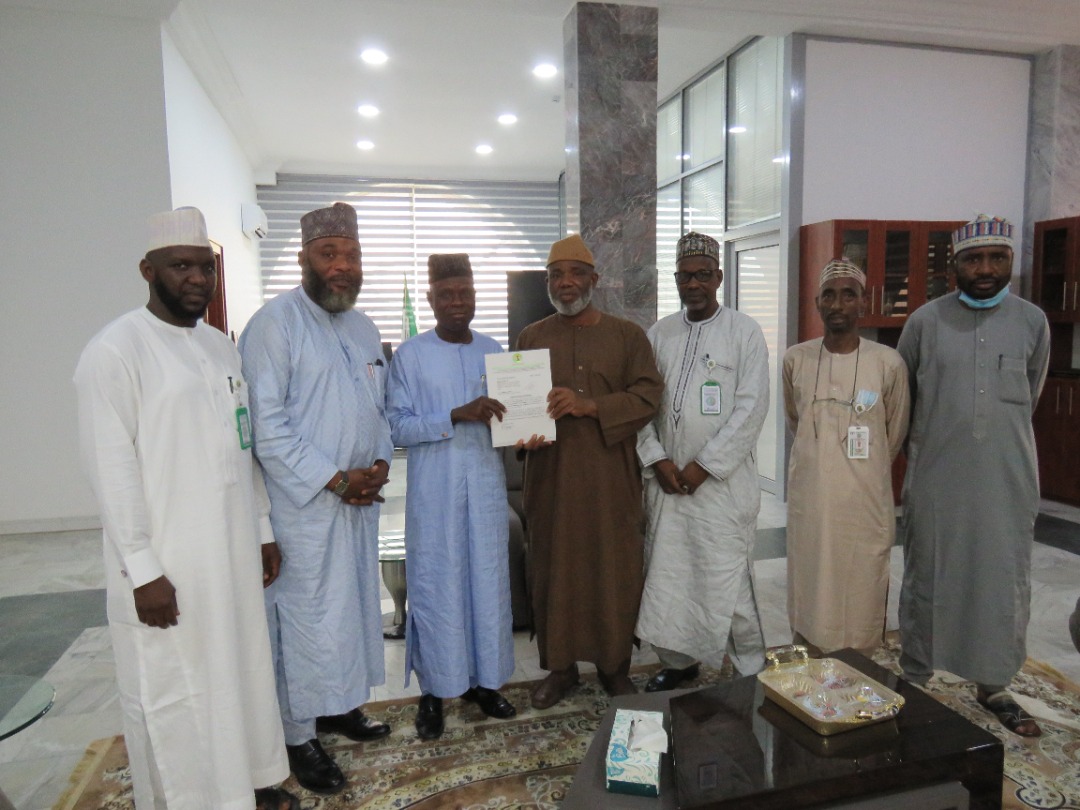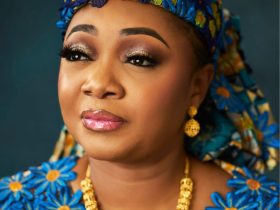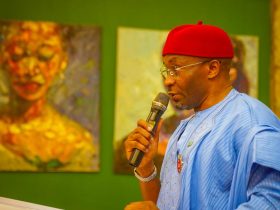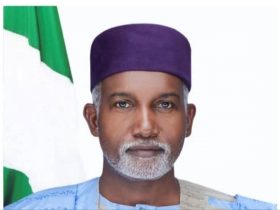
The Speaker of the Ghanian Parliament, Hon. Alban Bagbin, has called on the Nigerian Government to review the prohibition items banning the importation of specific commodities into the countrys market from other countries, including Ghana.

According to Bagbin the request underlined by the resolution as captured in the communique of May 31, 2021, which follows efforts by the leadership of Ghana and Nigeria parliaments to pursue parliamentary diplomacy towards finding a lasting solution to the trade impasse between some Ghanaian and Nigerian traders in Ghana.
He made the request yesterday while addressing members of the House of Representatives in Abuja.
He said the visit followed an invitation by the leadership of the Nigerian parliarment
Read the full speech below;
ADDRESS DELIVERED BY THE RIGHT HON ALBAN SUMANA KINGSFORD BAGBIN, SPEAKER OF THE PARLIAMENT OF GHANA, TO MEMBERS OF THE HOUSE OF REPRESENTATIVES OF THE FEDERAL REPUBLIC OF NIGERIA ON WEDNESDAY JULY 7, 2021 IN ABUJA, NIGERIA
Rt. Hon. Femi Gbajabiamila, Speaker of the House of Representatives of the Federal Republic of Nigeria
The Majority and Minority Leaders and Leadership of the House
Leadership of various Committees and Caucuses of the House
Hon. Members of this House
Distinguished invited guests
Our partners from the media
Ladies and gentlemen!I bring you felicitations from the President of the Republic of Ghana and Chairman of the Economic Community of West Africa States (ECOWAS), His Excellency Nana AddoDankwaAkufo-Addo. I also extend to you all warm and hearty greetings from the entire membership ofGhana’s Parliament and the good people of Ghana, who indeed, are your kith and kin.
Ghana salutes His Excellency Muhammadu Buhari, the President of the Federal Republic of Nigeria and the amiablepeople of Nigeria for your participation in the recent Statutory ECOWAS Summit, which extended the Chairmanship of Ghana’s President of the Community.The bold and decisive position Nigeria took at the Summit represents to me a statement of our joint commitment to consolidate our democratic gains across the sub-region. It manifests our joint resolution to fight anti-democratic tendencies, terrorism and related vices that appear to be on the rise in our sub-region.
Permit me to also seize this opportunity to applaud the efforts of His Excellency Goodluck Jonathan in leading the ECOWAS Mediation team to find a solution to the political instability in Mali.Above all, my deep respect and appreciation also go to my good brother, friend and colleague, Rt. Hon.Olufemi Hakeem Gbajabiamila, for his cuttingurge parliamentary diplomacy and visionary initiative of cementing the already great and cordial historic diplomatic relations between Ghana and Nigeria. I do not have the appropriate words to describe his gracious invitation to host me and for us to continue with efforts to actualize the vision, but also to address thedistinguished Members of the House of Representatives of Nigeria. This ishistoric, a momentous feat unparalleled by any Speaker of the Houses of our two countries in our post-independence democratic history. This honor, no doubt, is a practical step towards cementing the bonds between our two great nations, particularly our legislatures.
Rt. Hon. Speaker, kindly indulge me for a few minutes, to introduce members of my delegation to the House. I am accompanied on this trip by my wife, some senior members and staff of Ghana’s Parliament. Let meacknowledgemy wife, the person who made it possible for me to survive and win eight consecutive elections from 1992. The person who made sure I had the unwavering support and votes of my constituents and MPs to be in Parliament for 28 years and still counting. I am referring to no other person than my lovely and adorable wife, Mrs. Alice AdjuaYornas.
Rt. Hon speaker, the senior members and staff of Ghana’s Parliament with me include:
Hon. Carlos Kingsley Ahenkorah, Chairman, Committee on Trade and Industry
Hon. Emmanuel ArmahKofi-Buah, Ranking Member, Committee on Trade and Industry
Hon. Bryan Acheampong, Chairman, Committee on Foreign Affairs
Hon. Samuel OkudzetoAblakwa, Ranking Member, Committee on Foreign Affairs
Mr. Cyril KwabenaOtengNsiah, Clerk to Parliament
Mr. Richard Kwame Acheampong, Head of Parliamentary Relations and Protocol
Ms. Anita Shirley Quartey-Papafio, Head of the Speaker’s Secretariat
Mr. Justice DansoNorvor, MyAide
A. S. P. Simon Tenkuu, My Aide-De-Camp.
History of Ghana-Nigeria relations
Rt. Hon. Speaker, relations between Ghana and Nigeria predate our attainment of political independence. Ithas been characterized by our shared socio-political history and culture.Many Nigerians and Ghanaians don’t know the West African Students Union (WASU) was founded by twenty-one law students led by LadipoSolanke and Herbert Bankole-Bright, both of Nigeria. Yet they called on a PhD student from Ghana, Dr. J. B. Danquah to be the First President of WASU. Two champions of print media in the Gold Coast were Nnamdi Azikiwe of Nigeria who later became Governor-General of Nigeria and Wallace Johnson of Sa Lone now Sierra Leone, who founded the first labor Union in Nigeria in 1931.
We note the pioneering and inspiring role played by Osagyefo Dr. Kwame Nkrumah and his colleague young student activists since the Pan-African Conference of 1945 in Manchester that gave the final push towards the liberation and independence of African nations. That unity of purpose and infectious solidarity which characterized that era ensured that colonialism and imperialism were defeated. That solidarity and brotherhood must underpin our contemporary relations.
Rt. Hon. Speaker, I can go on and on with verifiable examples to establish that we are one and the same people.We are now for good historical and natural reasons made up of numerous and varied ethnic and tribal groups and people but from a background of a common official language, educational system, currency, air carrier and adjudicatory system at a point in our colonial history. These significantly contributed to our ability to work together in many spheres of endeavors.
The symbiotic nature of our relationship as a result of this cannot be gainsaid. This explains why within the sub-region, even though we do not share geographical boundaries, we share the same ideals. We see ourselves as one people with a common destiny.
Indeed, history tells us that a numberof ethnic groups in Ghana migrated from Nigeria. I am referring to the Gas in Greater Accra Region and the Mole-Mamprusi- Dagbani ethnic groups in the Northern part of Ghana. Their languages and traditions reflect those of the Yorubasand the more than 21 languages spoken in Gombe and Bauchi states. It is therefore not strange why our culture andtraditions with particular reference to our cuisine, dances, values and aspirations remain identical. A clear evidence of the artificiality of our borders occasioned by the Berlin Conference of 1884-1885 which partitioned Africa amongst the imperialists.
Rt. Hon. Speaker, despite all these commonalities, it is important to mention at this stage, that relations between our two countries have not always been smooth.Consistent with the tongue and teeth metaphor which has it that even though the tongue and teeth play complementary roles in the digestive process, they come into conflict occasionally. Similarly, our relations have had its own challenges every now and then.
The events of 1969, when through the Aliens Compliance Order, Ghana expelled a large number of Nigerians and the 1983 Ghana must go, which saw Nigeria deporting about one million Ghanaians, are dark days in the history of our two countries. These actions were destructive to the socio-economic and fraternal relations between Ghana and Nigeria and stretched the fabric and strands of bonds beyond measure.It is no wonder that successive leaders of our two countries have, since then, vowed never to allow those incidents to ever recur.
The issue of Nigerian traders in Ghana
It is on this basis that I commend my brother and colleague, Rt. Hon.Gbajabiamila, and my predecessor, Rt. Hon. Professor Aaron Michael Oquaye, for their noble efforts in pursuing Parliamentary Diplomacy towards finding a lasting solution to the trade impasse between some Ghanaian and Nigerian traders in Ghana. This impasse followed the full implementation of the Ghana Investment Promotion Centre Act, 2013 (Act 865), which occasioned the closure of shops belonging to some foreigners including some of our brothers and sisters from Nigeria.Rt. Hon. Speaker your visit to Ghana in September 2020 demonstrated a significant commitment on your part and the leadership of our two legislatures to strengthen the bonds that exist between us, as one people and with it the development of our two countries.For that reason, you and your counterpart defied the threat posed by the COVID-19 Pandemic to reach out to one another, at a time when the global community was living in fear of such physical contacts.
The conclusions you arrived at, which were encapsulated in the joint communique issued after the visit, provided the basis for redefining our relations, in terms of our history of cooperation, to forge a better future for the citizenry of our two nations.
These conclusions were reinforced by the communique issued after the recent meeting between our ministers responsible for Trade on the sides of the Extraordinary ECOWAS Summit on the Political Situation in Mali held on 31st May 2021 in Accra.
As I have repeatedly stated on various platforms, if COVID-19 has taught us any lesson, it is that no country, no individual and no group of persons can succeed on its own efforts.Given the nature of global emerging challenges which tend to be trans-territorial and trans-generational, we need, as people and nations to forge and bond together.If we want to survive in peace and prosperity, we have no alternatives than to work together to find common solutions in this global village.Rt. Hon. Speaker, Ghana and Nigeria are forerunners in this respect. Our history of oneness, kith and kin, and good relations makes it imperative for us to make all necessary efforts at forging together in peace and harmony on all fronts of our socio-economic life.
Rt. Hon. Speaker, I am here just to help bring finality to the impasse. I pledge my commitment and that of the Parliament of Ghana, to contribute in every way possible to end the impasse between traders of our two sister countries.The Ghana-Nigeria Friendship Act
In furtherance of that, under my leadership, the Parliament of Ghana has appointed a seven-member committee as Ghana’s delegation to the Joint Committee of Eminent Persons of our Legislatures. They will interact with their Nigerian counterparts towards passing the “Ghana-Nigeria Friendship Act”. The Act will set up the proposed “Ghana-Nigeria Business Council”, which is intended to provide the legal and institutional framework to sustain the continued friendship and business interests of our people.I am particularly glad to indicate that they are with me on this trip and are ready to engage with their counterparts towards realizing the intentions expressed in the Act.
The communique of 31st May 2021 meeting, suggested in part a ring-fencingof some of the thorny requirements of the Ghana Investment Promotion Centre Act, 2013(Act 865).This was a laudable suggestion.Of particular mention, in this regard,is the reconsideration of the one million United States-Dollar minimum capital requirement for trading enterprises under section 28 (2) of the Act. This is to facilitate regularization of the businesses of the affected Nigerian retail traders in the trade impasse.
Equally commendable is the special concession to be applied to the requirement for the payment of 0.5 per cent Stamp Duty on the capital investment required by both the GIPC and the Registrar-General’s Department in respect of investment by foreign nationals.Rt. Hon.
Speaker, it is understandable that the meeting resolved to apply all other aspects of the legal requirements in respect of foreigners’ participation in retail trade in Ghana and Nigeria. Recent and emerging security imperatives necessitate that while we seek to deepen cooperation among citizens of our two countries, we must not fail to prevent opportunists from taking undue advantage of loopholes in our systems that might tend to jeopardize the economic fortunes of our respective countries.
Nigeria’s prohibition list
Rt. Hon. Speaker, we are making progress in resolving the concerns of the Nigerian traders in Ghana. It has been a joint effort between our two countries.That is always the way to go if we are interested in the peace and development of our countries. I am confident that the intervention of our two legislatures in this effort will yield results.
Whilst at it, it is said that it must be peace without victory.Only peace between equals can last.To this end, it will be highly appreciated if the Government of Nigeriawill review the prohibition list banning the importation of specific goods and commodities into the Nigerian market, from countries including Ghana. This request is underscored by the resolution as captured in the communique of 31st May 2021 referred to supra. I have no doubt, Rt. Hon. Speaker, under your sterling leadership of the House of Representatives of the Federal Republic of Nigeria, an institution of measureless might and majesty, Nigeria can fine tune the prohibition list to align with contemporary international trade practices.
The coming into being of the African Continental Free Trade Area signals that we are open for business and mutually beneficial investments. Indeed, Africa’s prosperity depends largely on intra African trade. Increase in trade volumes is the surest way to deepen regional integration in Africa.
The low levels of trade among African countries as compared to trade with other parts of the world constitute one of the defining characteristics of our continued poverty.
Data available from the United Nations Economic Commission for Africa (UNECA) indicates that in 2019 Africa’s total volume of trade was about US$460billion, however only US$69billion of this huge volume of trade was transacted among African nations. What is even more worrying is that most of these imports traded can be produced and procured in Africa.
This unfortunate trend hinders prospects of bringing the needed prosperity to our people. It results in the frailty of our security situation given that the rising youth unemployment on our continent which is the world’s youngest continent, occasioned by this unpleasant development, provides handy tools to those so minded to perpetrate all acts of vandalism, hooliganism and violent extremism.
Conclusion
Rt. Hon. Speaker, let me conclude by affirming my readiness to contribute to deepening the Parliamentary Diplomacy that have been commenced to deal with all current and future challenges that our continent may be confronted with.I am particularly excited about the Conference of Speakers and Heads of African Parliaments (CoSAP) initiative to pursue the cancelation of the rising debt situation in Africa, occasioned by the impact of the COVID-19 Pandemic.
I am of the firm conviction that with effective Parliamentary Diplomacy in support of theExecutive arms of our government, as well as our development partners, this initiative will seea resounding success. Our history is replete with instances where Ghana and Nigeria have confronted and overcome our challenges. Working together, this seeming mountain before us shall be a pebble behind us.
Rt. Hon. Speaker, as for the debate on which of us has the best soccer team and the best jollof, I believe that rivalry will continue unabated even though you all know where I stand on that debate.
On this note, Rt. Hon Speaker, Hon Members of the House of Representatives, Distinguished Ladies and Gentlemen, God bless Ghana- Nigeria relations.
I thank you all for the audience.













1 Comment